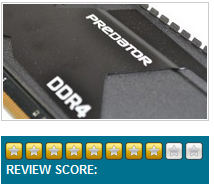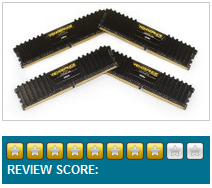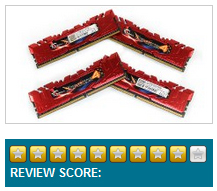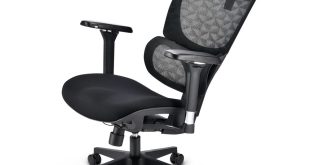As far as performance goes, there is very little room to separate the three kits when running at 3000MHz. Corsair's Vengeance LPX modules do consistently score slightly lower than the G.Skill and Kingston parts due to looser timings, but the 3GHz XMP configuration is a bonus and is not the kit's default selling frequency.
G.Skill's kit has the tightest timings at 3GHz, and therefore has the edge in Sandra's memory bandwidth analysis. Despite that, benchmark performance is largely bested by the Kingston HyperX Predator kit, albeit by tiny (almost insignificant) margins.
The Kingston and G.Skill kits, both of which are suggested to use Hynix MFR memory chips, managed to reach an overclocked speed of 3144MHz at their stock timings and voltage levels (which was 1.50V for our early Kingston sample). This allowed them to offer more than 60GBps of memory bandwidth. Corsair's Vengeance modules had no headroom above their faster-than-standard operating frequency of 3GHz.
And then we get to the ‘elephant in the room' – pricing. DDR4 availability is scant – there's no denying that. With early adopters fighting for stock from sellers, and retailers jousting for availability from distributors (and so on), it very much becomes a game of supply and demand for the market's post popular kits (a group in which these three kits belong).
I could spend the next three paragraphs analysing price variations between competing retailers or the UK against the US, etc.. But, quite frankly, it makes far more sense to completely remove price from the analysis and product scoring metric. Time, and shipments from the DRAM fabs, will allow stock to increase, which will lead to stabilised retail pricing.
Which kit would I show preference towards? That's a tough question, and there's no one answer. As with all hardware purchases, it depends on your individual preferences. The key point to take from this article is that DDR4 is still in its infancy and, unfortunately for the memory vendors, I think it could still be quite a while before we see the motherboard compatibility issues with high-speed kits fully ironed out.
Discuss this review on our Facebook page over HERE.
Kingston HyperX Predator 3000MHz 16GB (HX430C15PB2K4/16)
 Kingston's 3000MHz HyperX Predator kit showed marginally better performance through our benchmark tests, and was also able to overclock past 3100MHz.
Kingston's 3000MHz HyperX Predator kit showed marginally better performance through our benchmark tests, and was also able to overclock past 3100MHz.
But those points are compromised by CPU cooler-fouling heatspreaders.
Pros:
- Out-of-the box 3000MHz with XMP 2.0.
- ‘Backup' 2666MHz XMP setting.
- Strong overclocking potential.
- Attractive appearance.
Cons:
- Very tall heatspreaders can cause interference issues.
KitGuru says: A well-balanced memory kit that offers strong performance. Just make sure you have the clearance around your CPU socket for the 55mm-tall modules.
Corsair Vengeance LPX 2800MHz 16GB (CMK16GX4M4A2800C16)
 So we move on to Corsair's 2800MHz Vengeance LPX kit that features a 3GHz XMP setting. The big bonuses here are 2800MHz pricing and the redundancy of another high-speed XMP setting if 3000MHz proves too much for your motherboard.
So we move on to Corsair's 2800MHz Vengeance LPX kit that features a 3GHz XMP setting. The big bonuses here are 2800MHz pricing and the redundancy of another high-speed XMP setting if 3000MHz proves too much for your motherboard.
On the down side, both profiles used looser timings than the competing kits, and previous (and current) data suggests that the pricing gap may not be as significant as one would expect.
Pros:
- Positive motherboard compatibility with 2800MHz XMP 2.0 configuration.
- ‘Bonus' 3000MHz XMP setting.
- Short heatspreaders.
- Pricing for 2800MHz kit (even though a 3000MHz profile is included).
Cons:
- Timings are looser than many competing kits.
KitGuru says: Corsair's use of a 2800MHz XMP setting is smart because it bypasses many of the motherboard compatibility issues plaguing the 3GHz+ memory modules. Tighter timings, in line with competing 2800MHz memory kits, would have given a welcomed performance boost.
G.Skill Ripjaws 4 3000MHz 16GB (F4-3000C15Q-16GRR)
 I think it's fair to say that G.Skill has the advantage when it comes to support. Numerous industry contacts have informed us how G.Skill and motherboard vendors worked closely to optimise their hardware.
I think it's fair to say that G.Skill has the advantage when it comes to support. Numerous industry contacts have informed us how G.Skill and motherboard vendors worked closely to optimise their hardware.
That's advantageous for early adopters who are still tackling the ugly side of being (excuse the hyperbole) a paying beta tester for new hardware that is proving difficult for component vendors to optimise.
If mine was the wallet being opened, I would be leaning towards a purchase of the G.Skill Ripjaws 4 3000MHz kit. Overclocking capacity was the joint-highest, but was completed with a lower voltage and tighter timings, and G.Skill's use of sensibly-sized heatspreaders is smart. Having continuously battled with memory compatibility on X99 motherboards since mid-August, I have gained an appreciation for owning a memory kit that other companies are using as the benchmark for tweaking their hardware.
While the latter is, admittedly, a questionable metric to relate to a somewhat hesitant recommendation (the motherboards' fault, not the memory's), there is so little to tell each kit apart, that potentially enhanced support becomes a justifiable factor in swaying a purchase.
Pros:
- Out-of-the box 3000MHz with XMP 2.0.
- Overclocks past 3100MHz with stock timings and voltage.
- Short heatspreaders.
- Positive support from various component (mainly motherboard) vendors.
Cons:
- A slower-speed secondary XMP setting would be useful (especially by those who are waiting for BIOS updates to run at 3GHz).
KitGuru says: An all-round positive memory kit. Tight timings balanced with the high-frequency and promising motherboard support make the G.Skill Ripjaws 4 an attractive option.
 KitGuru KitGuru.net – Tech News | Hardware News | Hardware Reviews | IOS | Mobile | Gaming | Graphics Cards
KitGuru KitGuru.net – Tech News | Hardware News | Hardware Reviews | IOS | Mobile | Gaming | Graphics Cards






I AM IN IT TO WIN IT GREAT MEMORY
Thanks KitGuru – been struggling to work out how to get my Corsair 4 x 4GB 2800MHz to play ball in my Rampage V – just the article I needed to get my head around the XMP settings 🙂
Is there any real difference between DDR3 and DDR4 that would justify to get DDR4 for a new rig right now despite the difference in price ?
You don’t have a choice if you plan on building an X99 system. It only uses DDR4 memory modules and you can’t use DDR4 on Z97 and older mainstream motherboards. But if you mean Z97 with DDR3 vs X99 with DDR4, then their is real and significant performance difference.
yes, I meant Z97+DDR3 vs Z99+DDR4, especially for games.